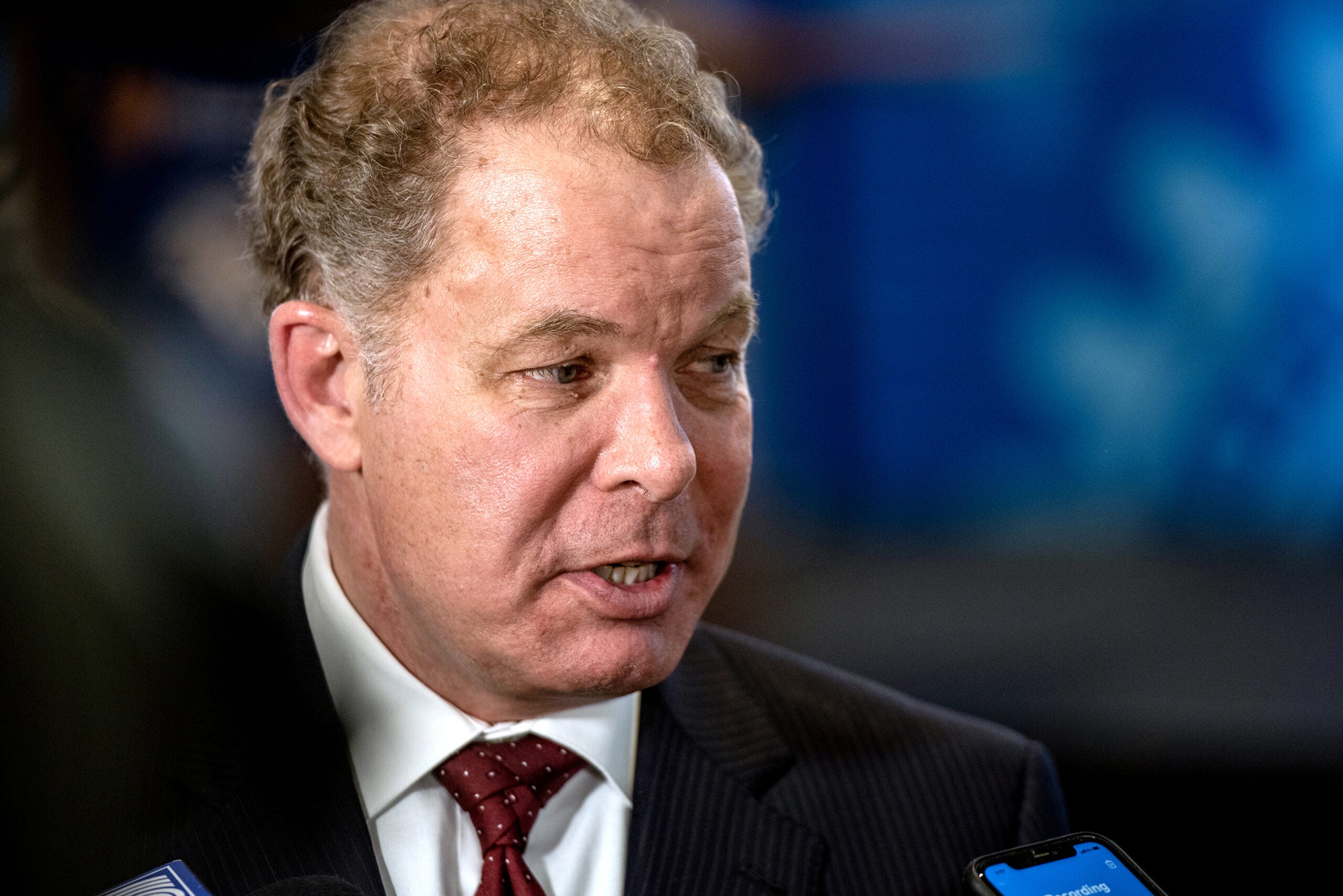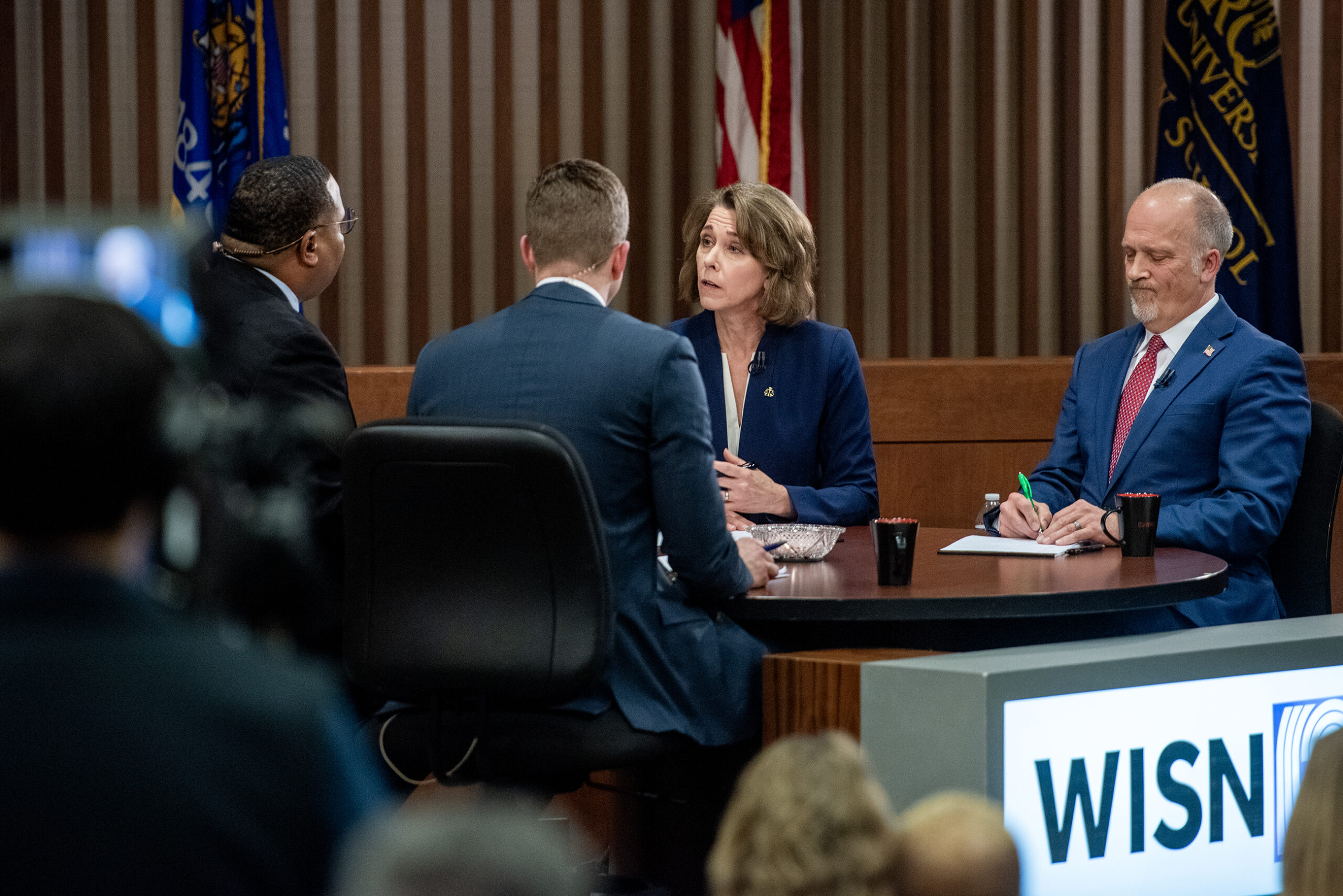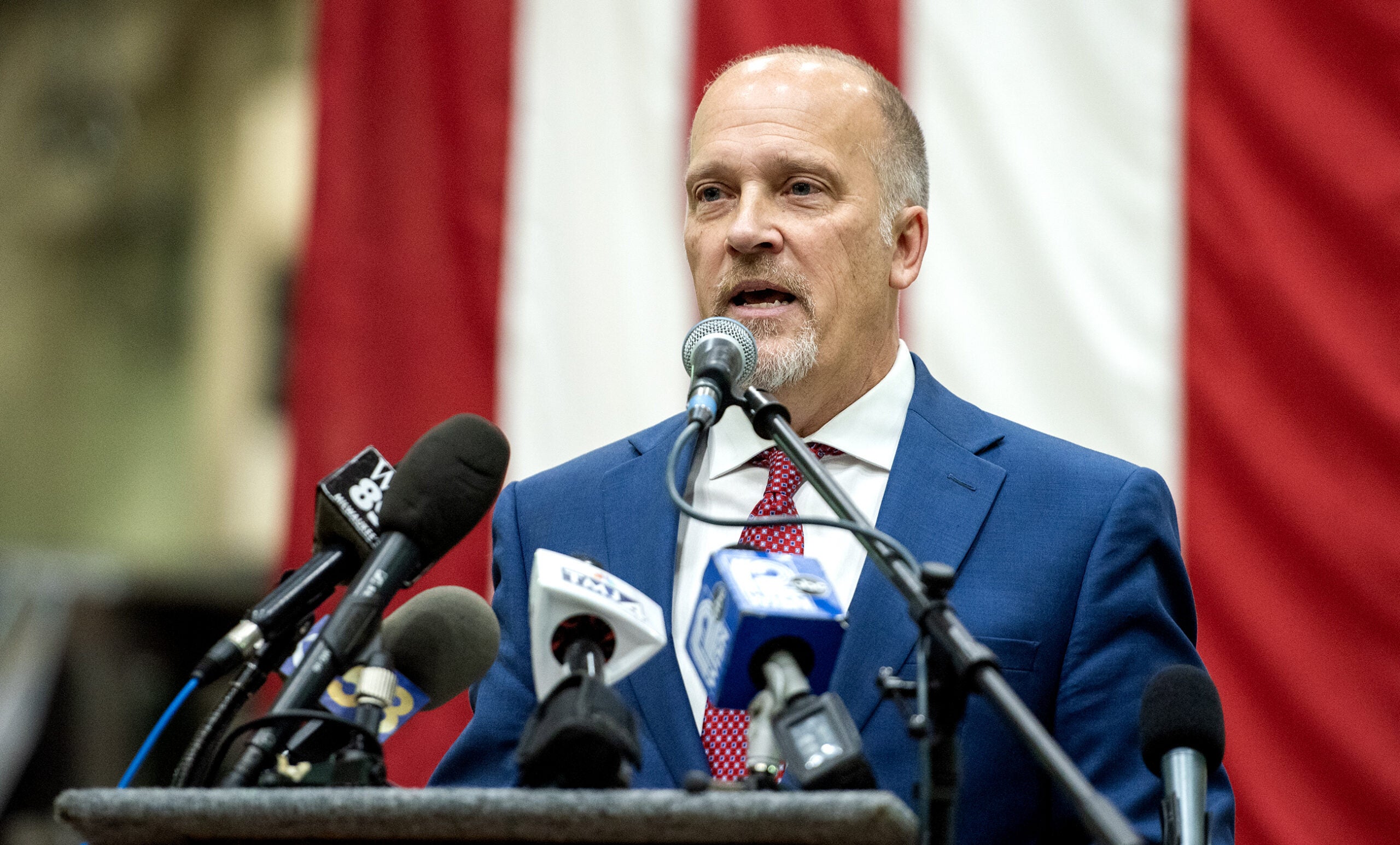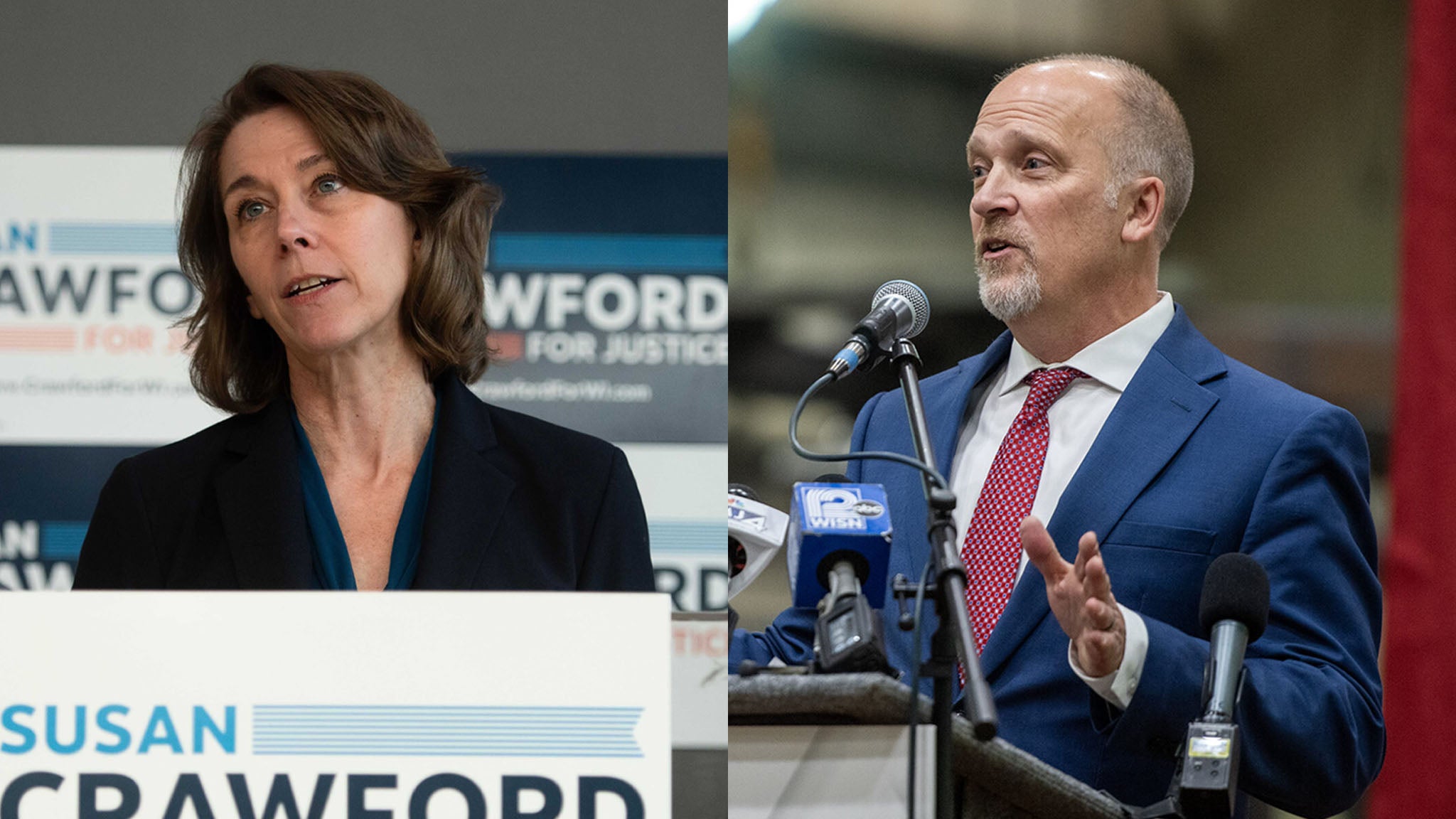Dan Kelly is promising voters he won’t be political if they return him to the state Supreme Court, even as the forces of Republican politics swirl around him like a storm.
Kelly, who was appointed to the court by former Republican Gov. Scott Walker in 2016 and lost his previous bid for election in 2020, speaks about himself in understated terms that feel out of place for an election that will determine the ideological balance of the court and could set Wisconsin’s political course for years to come. He presents himself as devoted to the Wisconsin Constitution and the rule of law. His “superpower,” Kelly likes to say, is that he’s boring.
His supporters have taken a decidedly different approach as the urgency of the election has started to sink in for the GOP base. To hear conservative activists describe the race, it’s not judicial philosophy on the ballot, but decades of Republican accomplishments, from voter ID to gun rights to Walker’s signature collective bargaining law.
Stay informed on the latest news
Sign up for WPR’s email newsletter.
“All these things are up for grabs,” said Bob Dohnal, a longtime Republican activist from Wauwatosa, who publishes The Wisconsin Conservative Digest.
In mid-March, Dohnal organized a “Conservative St. Pat’s Party” at Clifford’s Supper Club in Hales Corners, a village in southwest Milwaukee County. Dohnal, wearing a National Rifle Association baseball cap and a shirt decked with four-leaf clovers, greeted friends at a table near the bar. White holiday lights draped the ceiling, and at the other end of a long banquet hall, a band played.
Dohnal said Kelly has run a “strict constitutionalist” campaign, which he respects. It’s a bit different, though, from Dohnal’s approach.
“I call these educational rallies,” Dohnal said. “That’s what I do, is work like hell to get out the vote.”
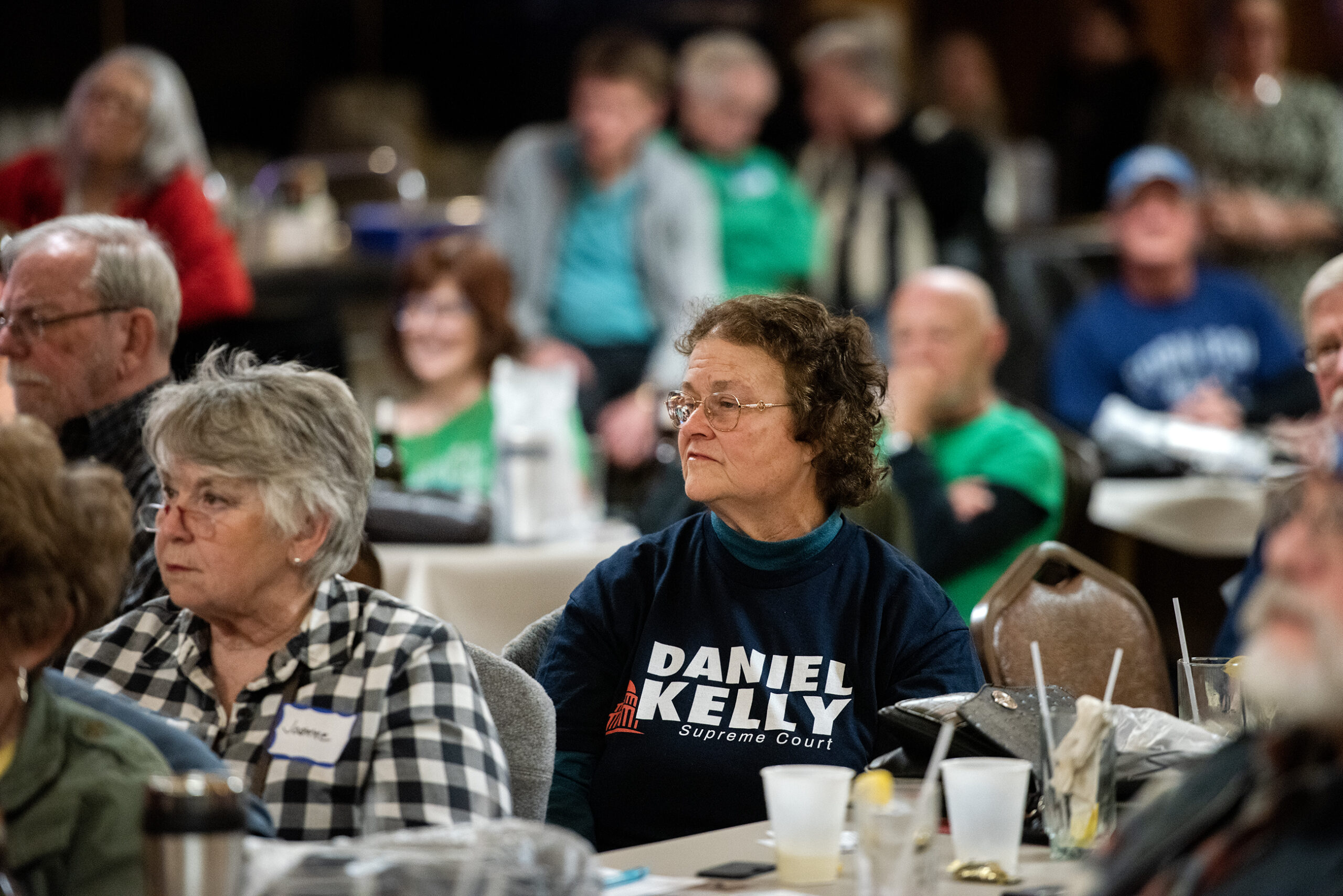
Dohnal has plenty of like-minded company here, longtime activists who understand how judicial races are won and lost.
“They tend to revolve around the crime issue, you know, who’s tougher on crime,” said Orville Seymer. “This year, it’s a little bit different because the left is using the abortion issue.”
Kelly and his conservative allies have hammered Milwaukee County Judge Janet Protasiewicz for sentences she handed down on the bench that they said were too light. Protasiewicz has been outspoken about her support for abortion rights, pointing out that Kelly is endorsed by the state’s three anti-abortion groups.
Like Dohnal, Seymer said keeping the court for conservatives would mean preserving the laws Republicans passed during the Walker years, which include the legislative and congressional maps Republicans first drew in 2011. He said the U.S. Supreme Court’s Dobbs v. Jackson decision overturning Roe v. Wade was also at play.
“All those things don’t appear on the ballot, but they really are on the ballot, and people are voting on those issues,” Seymer said. “And the people here in this room — conservative people — they want to maintain that.”
Seymer said there’s no way of knowing for sure how a justice would rule in a case before a case is before the court.
“But you know, they all kind of leave these little signals,” Seymer said. “It’s just reality.”
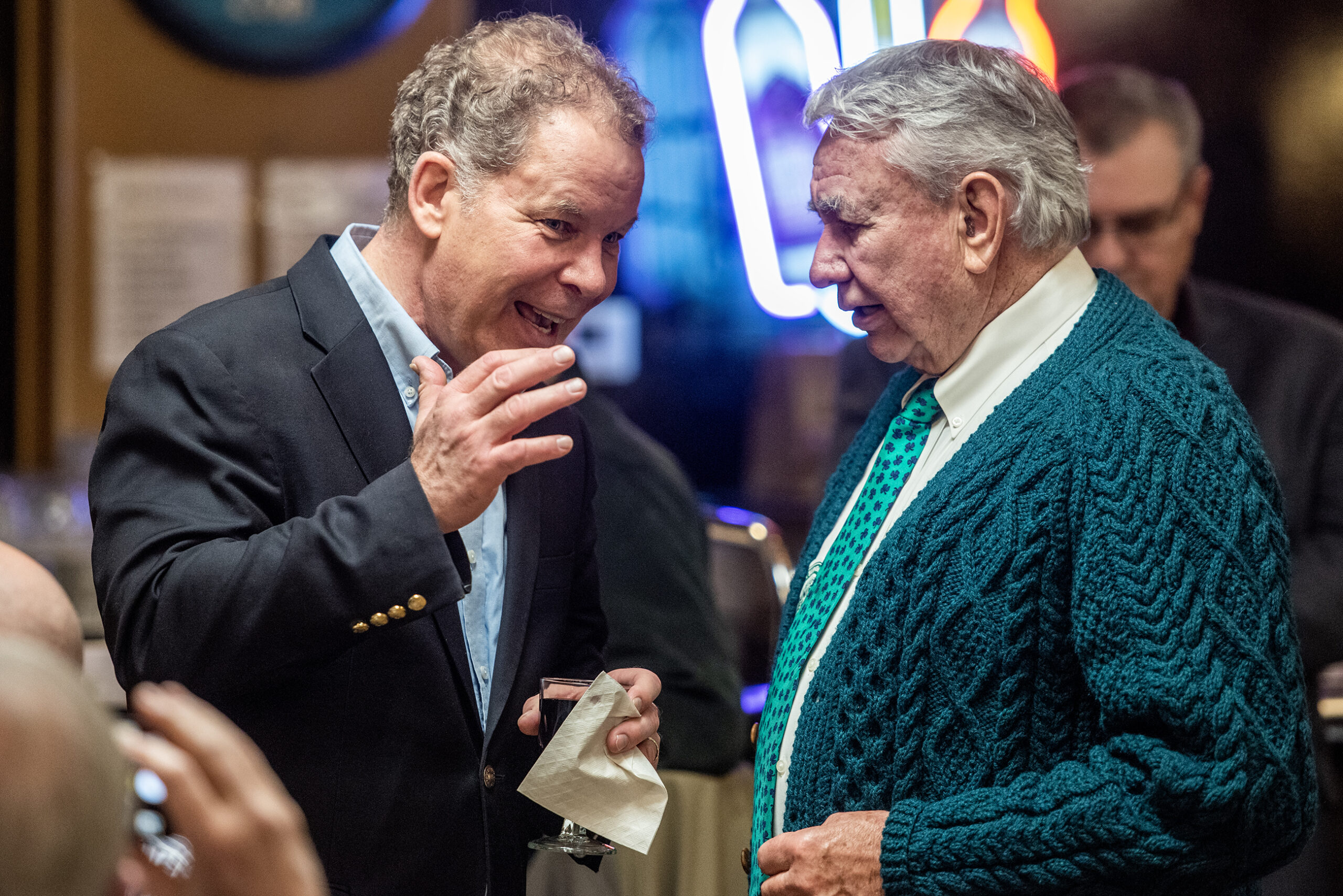
Kelly’s supporters at this dinner included Scott Presler, a young Republican activist who travels the country drawing national attention to state and local races. Presler, who once called the January 6th insurrection the “largest civil rights protest in American history,” has been a regular guest on former Trump adviser Steve Bannon’s show, framing Kelly’s race against Milwaukee County Judge Janet Protasiewicz as critical to Republican efforts to win back the White House.
“Janet will be the deciding vote striking down voter ID laws in your state,” Presler warned Republicans. “She’ll be the deciding vote allowing for unmanned drop boxes on every street corner in Madison and Milwaukee.”
Also in the supper club was former Republican Gov. Tommy Thompson, who warned the crowd that if Kelly loses, policies Thompson championed in the 1990s could be on the chopping block, including the private school choice program.
“If the court gets in control of the liberals, look out,” Thompson said. “Everything that we believe in, as conservatives, is going to be up for grabs. That’s how important the election is.”
Kelly has worked for a long list of Republican clients
Dan Kelly is more lawyer than barnstorming speaker at events like these. When it was his turn to address the crowd, he spent a few minutes of his stump speech talking about Alexander Hamilton.
“And you guys know, Hamilton, right?” Kelly asks. “The Broadway star?” The crowd laughed.
Hamilton — the founding father — serves as a setup to the central theme of Kelly’s campaign, which is less about him and more about his opponent, Milwaukee County Circuit Court Judge Janet Protasiewicz. Protasiewicz has been outspoken in her personal support for abortion rights and has called the Republican-drawn legislative maps “rigged,” positions Kelly said crossed a line for a judicial candidate.
“She’s telling us in advance that she plans to combine the power of the court with the power the Legislature,” Kelly said. “If Alexander Hamilton were here today, he would look at her and say, ‘Janet, liberty has everything to fear from you.’”
Kelly talked more about Protasiewicz than he did about himself during this speech, which has been the case elsewhere, too. During a forum at the Milwaukee Press Club, Kelly didn’t talk about his own background until more than 40 minutes into the program, and only then after he was asked to by a member of the audience.
Kelly grew up in Colorado but came to Wisconsin to attend Carroll College in Waukesha, where he studied political science and Spanish. He said he was in seventh grade when he knew he wanted to have a long career in law, calling himself a “law nerd.”
“I am running to be the most boring Supreme Court justice in the history of the country,” Kelly said, adding that the role of the court is to be neither original nor innovative.
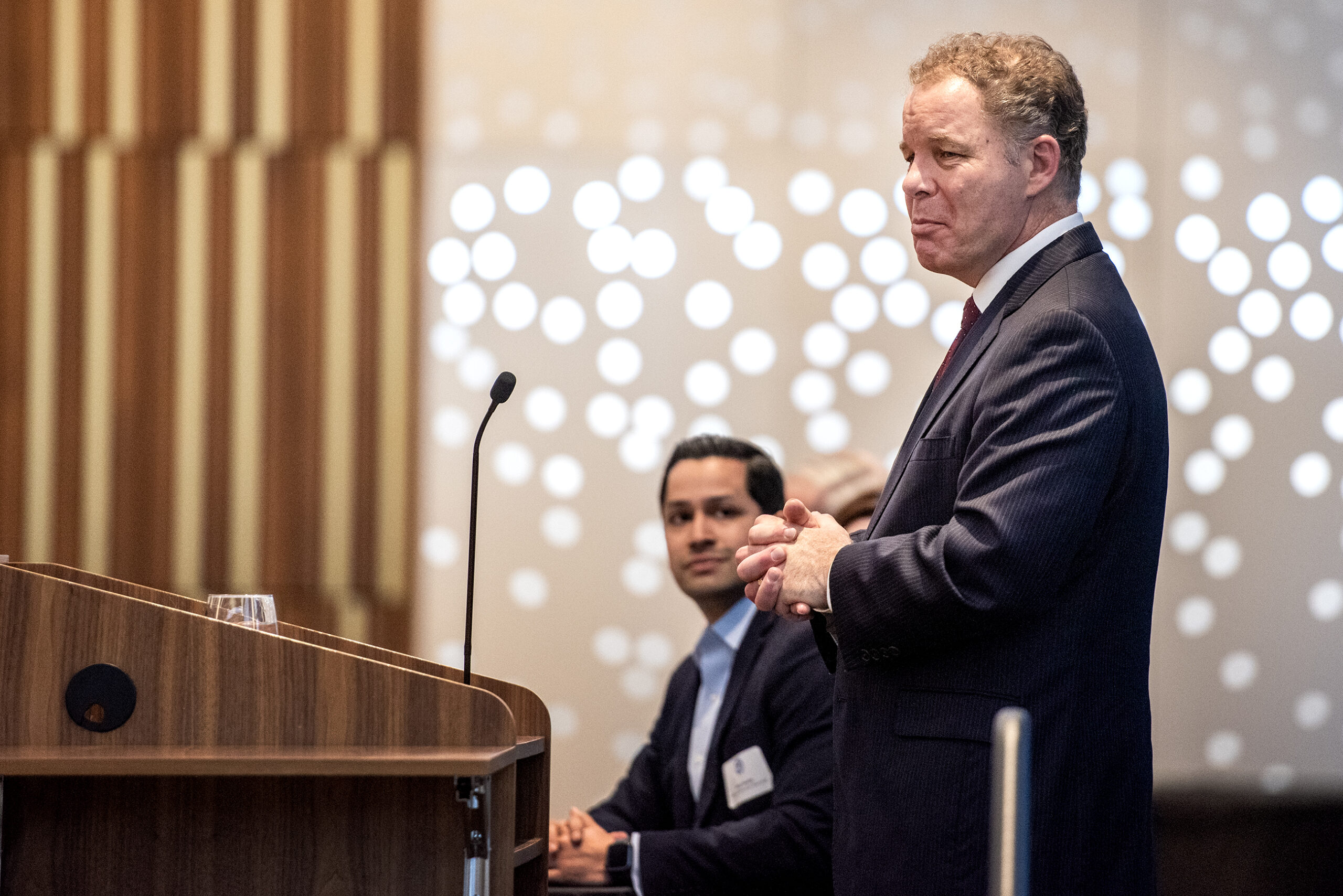
But Kelly’s resume is anything but mundane, reflecting a lawyer and justice who’s had a hand in either defending or upholding some of the most consequential Republican actions of the past dozen years.
He received his law degree in 1991 from Regent University, which was founded by televangelist Pat Robertson. Regent was originally named CBN University, after the Christian Broadcasting Network that Robertson began decades earlier.
As a private attorney in 2012, Kelly defended Wisconsin’s Republican-drawn redistricting plan in federal court, clearing the first major legal hurdle for maps that would entrench Republican majorities in the Legislature for the next decade.
“It’s a good map,” Kelly told reporters in 2012. “It’s a solid map. It’s constitutional. It reflects the judgment of the people of the state of Wisconsin.”
Kelly served on a litigation advisory board for the Wisconsin Institute for Law and Liberty, known as WILL, a conservative group that regularly appears before the court defending Republican policies, and trying to overturn Democratic ones. He was a reference for conservative Justice Rebecca Bradley when she applied for a vacancy on the court, and when Kelly applied for another vacancy in 2016, Bradley served as a reference for him.
His application to the governor’s office included a writing sample that likened affirmative action to slavery. It also referenced a blog he wrote between 2012 and 2015, in which Kelly gave his personal opinions on a range of political issues. In one blog post, Kelly said the goal of anti-abortion groups was “to preserve sexual libertinism,” leaving little doubt about his own views on the procedure.
“An abortion, of course, involves taking the life of a human being,” Kelly wrote in 2012. “And everyone involved in the subject knows it.”
Walker chose Kelly over 10 other applicants for the court, many of whom — unlike Kelly — had previous experience as judges.
When asked at the Milwaukee Press Club whether he stood by his blog posts, Kelly said his political views “are completely irrelevant” to his work on the court.
“If I were to start talking about my political views, that would be no more relevant to this race than who I think the Packers’ next quarterback ought to be,” Kelly said. “And you might notice I don’t talk about who the next quarterback ought to be. Because it’s not relevant to the position.”
Kelly’s recent clients included the state and national Republican parties
When Kelly ran for election to the court in 2020, he based his campaign at the headquarters of the Republican Party of Wisconsin. After he lost to now-Justice Jill Karofsky, Kelly returned to private practice and worked for a variety of GOP causes, including for the Republican Party of Wisconsin and the Republican National Committee.
Over the past two years, a Milwaukee Journal-Sentinel review found Kelly had been paid nearly $120,000 by the state and national Republican parties, with the bulk of it —$110,000 — coming from the RNC.
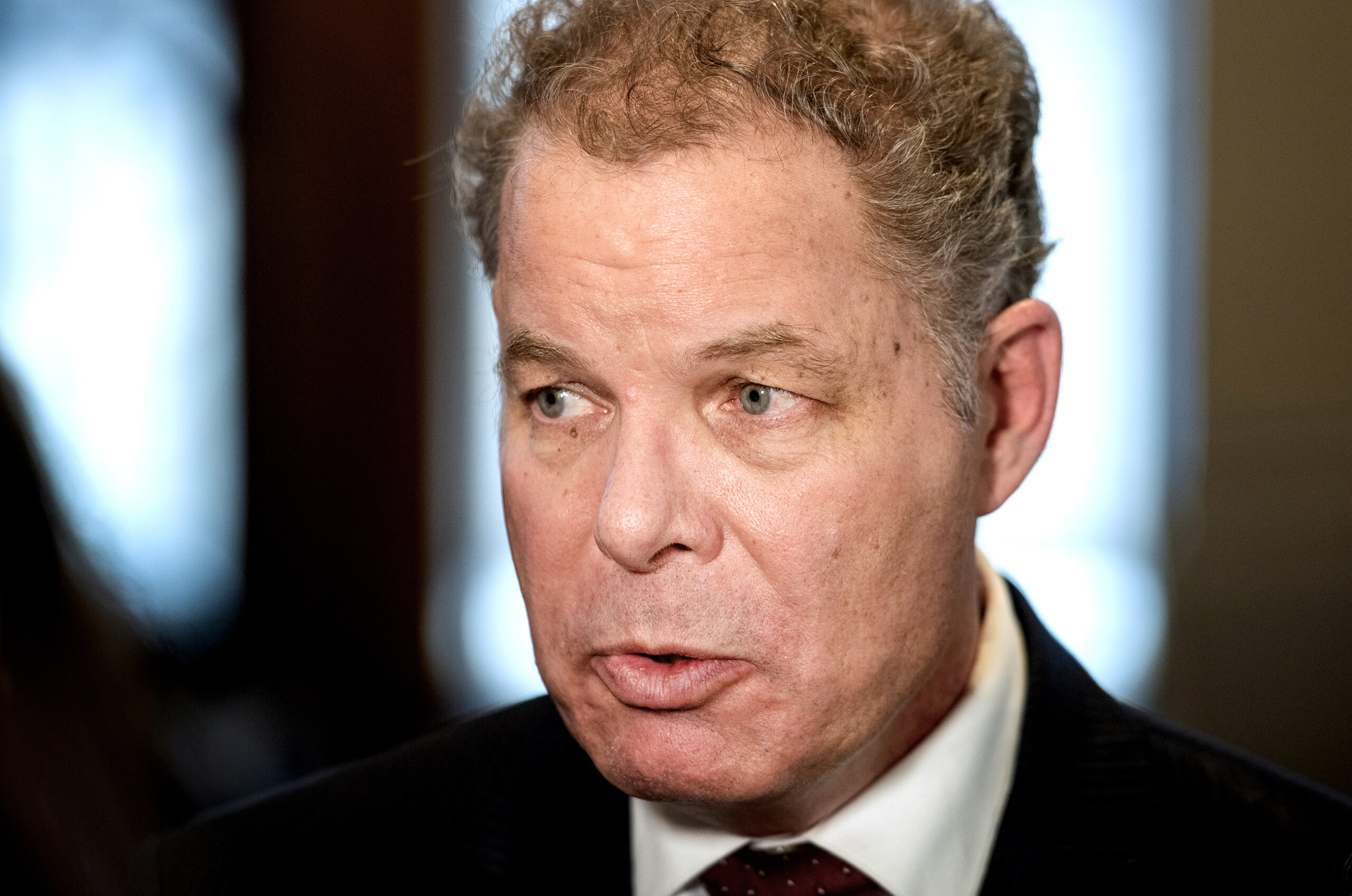
Former state GOP Chair Andrew Hitt told investigators for the U.S. House’s January 6th Committee that he spoke to Kelly about the Trump campaign’s plans to use false electors to contest President Joe Biden’s victory in the days after the 2020 election.
“Mr. Kelly, and I, you know, had some pretty extensive conversations,” Hitt testified last year after he was subpoenaed by the committee. Hitt also said he “talked for about a half hour” with Kelly on Dec. 7, 2020, one week before Wisconsin’s false electors met at the Wisconsin Capitol.
Kelly has dismissed suggestions that his work for the GOP will compromise his independence on the bench and said little when asked how he feels about the fake electors.
“I feel that the law should be applied and followed by everyone all the time,” Kelly said.
But Howard Schweber, a professor of political science and law at the University of Wisconsin-Madison, said Kelly’s connections send a message to conservative voters and groups.
“He has all of that background that, without him having to say anything, tells those interests that he is their guy,” Schweber said. “And in a way that frees him to be able to afford to run as a traditional conservative or even traditional judge … trusting that those more ideological voters will understand that this is just advertising.”
Outside groups have spent millions boosting Kelly’s campaign
Kelly arguably owes his political fortunes this year to conservative outside groups, who’ve done ad buys on his behalf that his own campaign can’t afford.
He forecasted this in February, at a time when he was competing for primary votes against Waukesha County Judge Jennifer Dorow, a fellow conservative. Speaking to potential supporters at a meeting that was recorded, Kelly argued he was the electable conservative in the race because the outside money groups would only back him.

“They will support me, but they won’t support Jennifer because she doesn’t have a proven track record,” Kelly said. “I’ve known these people most of my career who will be making the decisions on who to support in this race. And if it’s not me in the general election, it’s not like that money just moves on to the general. It just won’t be spent.”
GOP megadonor Richard Uihlein got things started for Kelly’s campaign this year. A group he funds called Fair Courts America spent an estimated $2.4 million on Kelly’s behalf ahead of the primary. Through March 20, it had spent a total of about $4.7 million, funding ads that paint Protasiewicz as soft on crime.
Wisconsin Manufacturers and Commerce, the state’s largest business group that helped Republicans win and hold a majority on the state Supreme Court for the past 15 years, also jumped into the race this month, running ads that attack Protasiewicz’s sentencing decisions. The firm Medium Buying, which works for Republicans, pegged WMC’s total ad buy at more than $5.1 million.
Those sums alone would nearly top the previous record for total spending in a Wisconsin Supreme Court race. The problem for Kelly, in this election, is that Protasiewicz’s campaign has raised even more.
“I think Republicans have become a little complacent in really relying on that super PAC money,” said Anthony Chergosky, a professor of political science at the University of Wisconsin-La Crosse.
Still, Chergosky said the recent donations wouldn’t be coming if outside groups thought Kelly had no chance of winning. A running tally by the firm AdImpact found total conservative ad spending — including outside groups and liberals — had outpaced total liberal spending recently.
But Chergosky said there are downsides to relying on outside support.
“PACs, Super PACs and other outside groups have to pay more for advertisements,” Chergosky said. “So this means that the Kelly money is not being used as efficiently.”
Three years ago, Kelly’s ads had a plucky feel to them. In one, Kelly’s daughter described him as a great judge who was “just super focused about it,” showing video of an enthralled Kelly reading a book of state statutes and admiring the Constitution. In another, Kelly sat at a diner counter in his judicial robe.
Kelly lost that 2020 race by about 10 points, a defeat he chalked up to a jolt in Democratic turnout from the presidential primary between U.S. Senator Bernie Sanders and Biden that was happening the same day. But the loss left some conservatives uneasy about whether he could win.
His ads so far this year, while lacking the funding of Protasiewicz, tell a different story. In one, he copies the style of the infamous “Willie Horton” commercial used by former Republican President George H.W. Bush against Democratic presidential candidate Michael Dukakis. In another, three sheriffs who’ve endorsed Kelly narrate a summary of one of Protasiewicz’s cases while ominous music plays in the background.
It’s not just on TV. Kelly has leaned into the attacks in his speeches, including the one he delivered at the Republican get-out-the-vote event in Hales Corners. He called Protasiewicz’s sentences “egregious,” claiming they “(teach) the criminal that there are no consequences to his actions.”
It’s a political strategy that’s familiar to Republicans and their voters, one they used to flip the court in 2008 and hold it in the 15 years since. Dohnal, the longtime conservative activist, said the race feels closer now than it did after Kelly emerged from the primary.
“Two weeks ago, if I walked into Target and talked to 100 people, 95 or so would say ‘What election?’ Dohnal said. “Now they’re starting to pay attention.”
Editor’s note: Read WPR’s profile of Supreme Court candidate Janet Protasiewicz here.
Wisconsin Public Radio, © Copyright 2025, Board of Regents of the University of Wisconsin System and Wisconsin Educational Communications Board.

